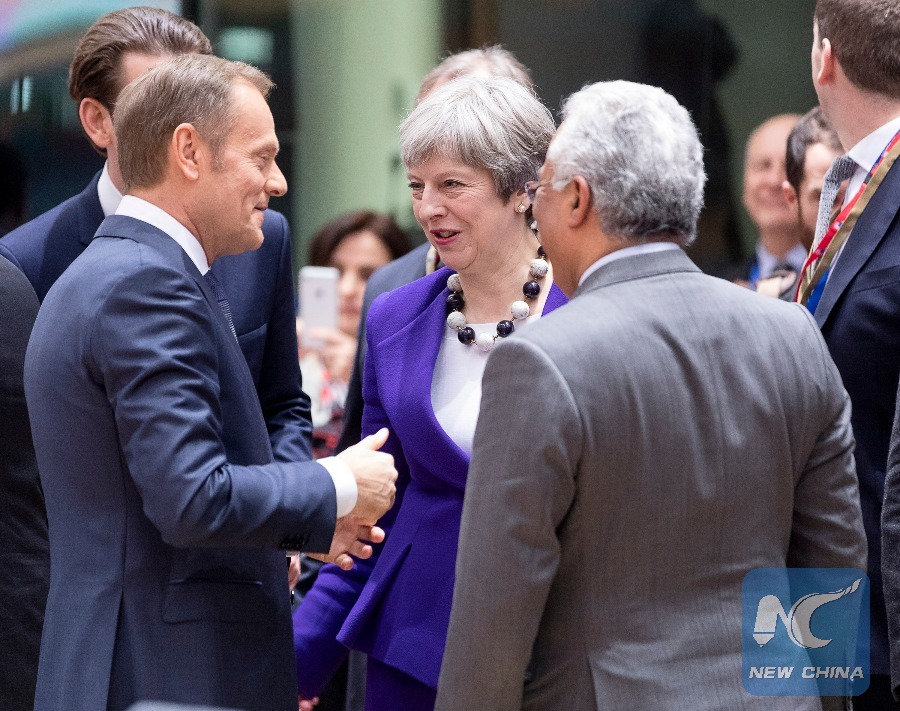
European Council President Donald Tusk (L, Front) talks with British Prime Minister Theresa May (C) and Portuguese Prime Minister Antonio Costa (R, Front) during the European Union (EU)'s spring summit at the EU headquarters in Brussels, Belgium, March 22, 2018. (Xinhua/Thierry Monass)
by Xinhua writer Deng Xianlai
BEIJING, March 29 (Xinhua) -- Though Britain will formally leave the European Union (EU) in exactly one year's time, it still remains deeply divided on Brexit, a decision adopted following a narrowly-won "Leave" vote in a chaotic 2016 referendum.
Ahead of her consensus-building tour across the island starting on Thursday, Prime Minister Theresa May promised compatriots a "bright future" outside the bloc that has defined Britons' identities and influenced their way of life since 1972.
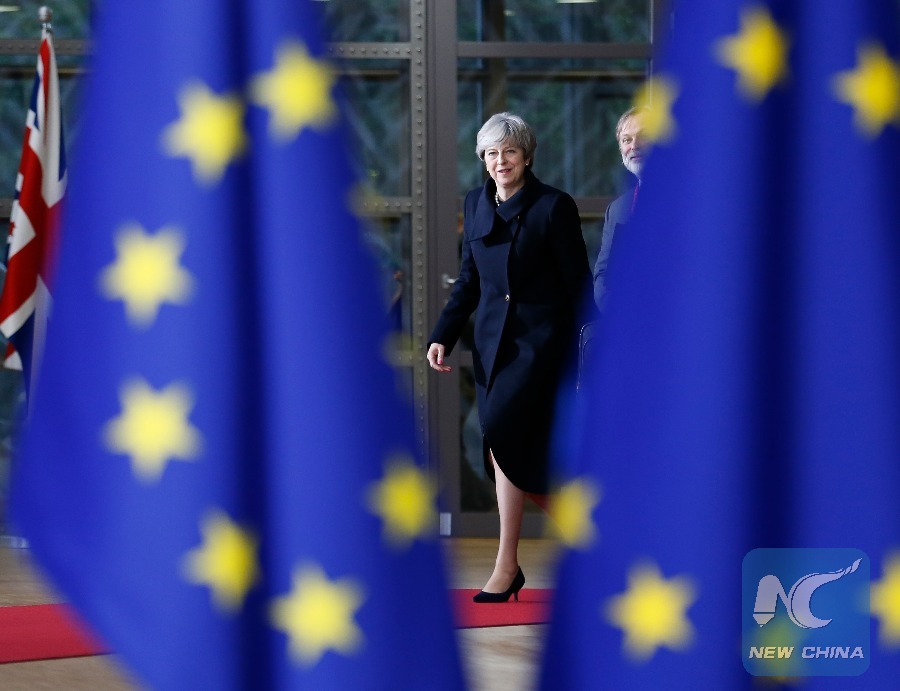
British Prime Minister Theresa May arrives at the EU headquarters for an EU Summit in Brussels, Belgium, Dec. 14, 2017. (Xinhua/Ye Pingfan)
"I am determined that our future will be a bright one," May said. "It's a future in which we trade freely with friends and partners across Europe and beyond. Having regained control of our laws, our borders and our money, and seized the opportunities provided by Brexit, the UK will thrive as a strong and united country that works for everyone, no matter whether you voted Leave or Remain."
But whether the prime minister's post-Brexit vision will cater to the aspirations of all citizens remains hugely doubtful amid the deep division domestically.
The Brexit referendum on June 23, 2016 saw Brexiteers edge out Remainers by a slim margin of 4 percentage points. The result not only surprised the world but also created an aftershock that has lingered on for almost two years.
While England and Wales voted to withdraw from the EU, Scotland and Northern Ireland sought status quo.
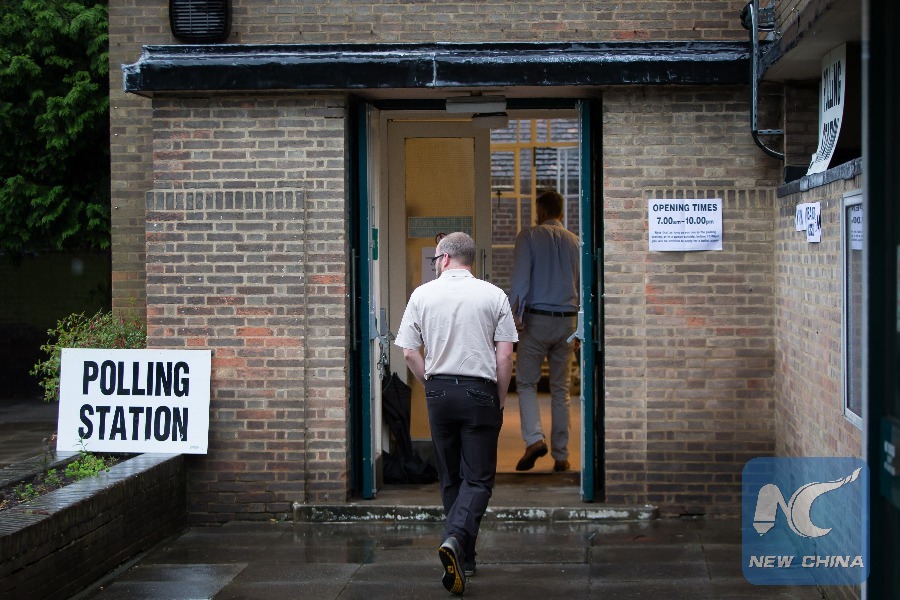
People arrive at a polling station to vote to stay in or leave the European Union (EU) in Harpenden, Britain, June 23, 2016. (Xinhua/Richard Washbrooke)
Given that reactions remain starkly opposite -- between those excited about Britain regaining freedom in decision-making and those disillusioned by the parting from a union that has raised Britain's international stature -- May, who became PM after a snap election following the referendum, still has a long way to go to bridge the rift.
IRISH BORDER ISSUE
May has been under pressure to hammer out a satisfactory arrangement with Brussels for delineating Northern Ireland's border with EU member Ireland.
The Irish border issue, one of the thorniest in the Brexit talks, remained a sticking point during the EU summit that concluded last Friday.
May has promised that no new barriers will be created within the common domestic market but didn't elaborate how the border issue would be resolved.
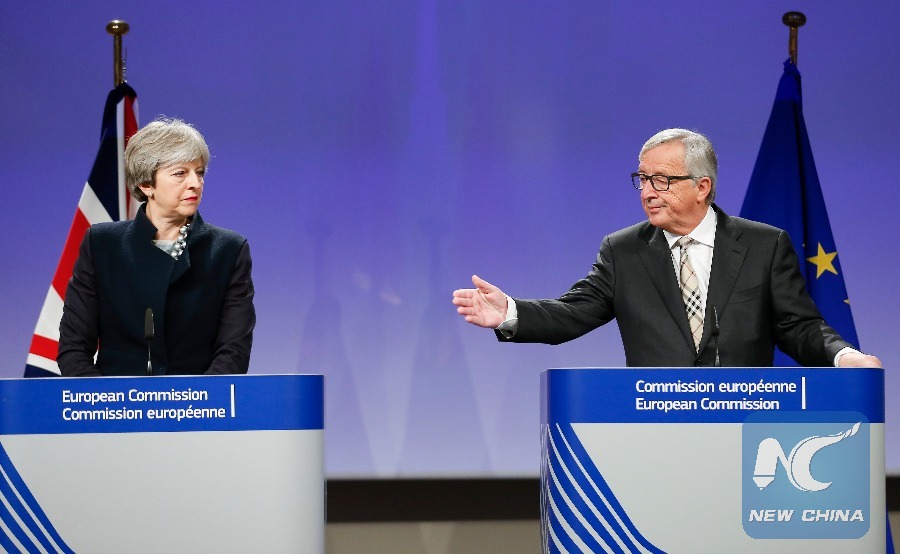
British Prime Minister Theresa May (L) and European Commission President Jean-Claude Juncker attend a press conference after their meeting on Brexit at EU headquarters in Brussels, Belgium, Dec. 4, 2017. (Xinhua/Ye Pingfan)
In an attempt to avoid a hard border with customs and checkpoints between Ireland and Northern Ireland after Brexit, the EU issued a draft resolution in February. It proposes that Northern Ireland set trade rules in line with the EU's single market and customs union if no better alternatives can be found.
Although both Dublin and London say the border should be "as seamless and frictionless as possible," a virtually invisible border will however lead to trade barriers between Northern Ireland and the rest of Britain as May has already decided Britain will leave the single market and customs union.
Maria Demertzis, deputy director of the Brussels-based think tank Bruegel, said, "Unless the Northern Ireland issue is resolved ... it's very difficult to see what type of trade agreement we will have." She said Britain remains vague, which makes the whole issue very difficult.
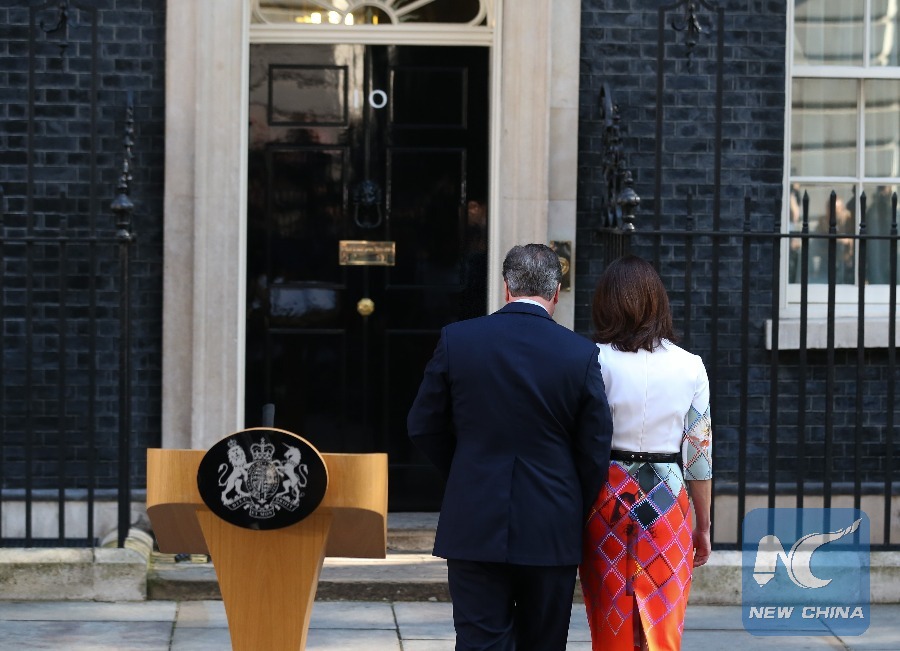
Photo taken on June 24, 2016 shows then British Prime Minister David Cameron (L) leaving with his wife Samantha after his speech at 10 Downing Street in London, Britain. Cameron announced his intention to step down after his country has voted to leave the European Union (EU). (Xinhua/Han Yan)
Iain Begg, a research fellow at the European Institute of London School of Economics and Political Science, called it a "trilemma."
Begg said although the ongoing bargaining would create "some kind of fudge", it would still mean breaking the Belfast Agreement reached in the 1990s.
The agreement set the basis for Northern Ireland's current system of devolved government under Britain and restored peace in the region after decades of political turmoil.
"What they have done is to kick the can down the road, but at some stage they have to go down that road and find a solution. Things cannot be fudged for ever," Begg said about May and her ministers' talks with the EU.
FUTURE TRADE FRAMEWORK
What could be considered a victory for May at the EU summit is Brussels agreeing in principle to grant Britain a transition period until 2020 -- 21 months after Britain's exit from the bloc. During this time London will effectively stay in the bloc but have no voting power.
While May said the transition period "gives certainty to people and businesses" and "gives them the clarity to plan for their future," the win came at the expense of Britain having to agree to the proposed Irish border solution that would see Northern Ireland subject to Brussels' rules.
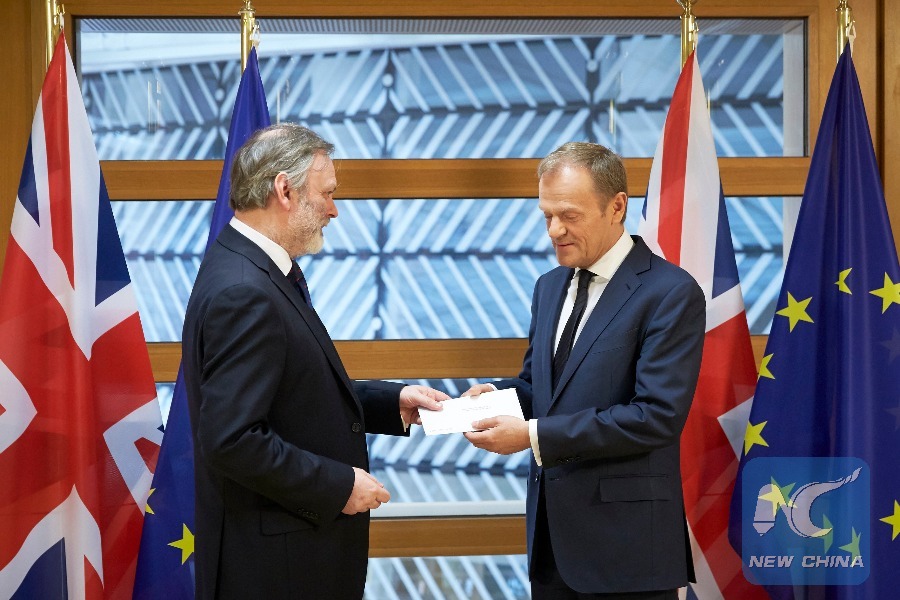
British Ambassador to the EU Tim Barrow (L) hands the Brexit letter to European Council President Donald Tusk in Brussels, Belgium, March 29, 2017. (Xinhua/European Union)
French President Emmanuel Macron has said that the EU won't allow London to "cherry-pick" from the "four freedoms" -- free movement of capital, labor, goods and services, both a privilege and obligation for EU members.
"There is not a choice of which sectors you sign up to. Once you are outside the single market, you're outside of it entirely," Macron said during the summit.
What is at the center of the grand bargaining is the future of Britain's financial services sector, the country's economic engine.
Britain wants to take advantage of the single market to benefit its financial service sector but also wants to restrict the movement of labor so as not to be affected by immigrant influx.
"The EU has been advocating that if you want to access the single market, you are going to necessarily accept the four freedoms," Demertzis said.
As regards the whole process of Brexit negotiations, the sequence set by the EU resembles a marital breakdown: first comes the divorce, which involves citizens' rights, money transactions and the Irish border, and then the new relationship, which touches on aspects such as foreign policy, financial sector and judicial cooperation.
But Britain wants to talk about future relationship, including trade, in parallel with the negotiation on the divorce deal.
According to the timetable, Brussels and London will agree on the divorce deal, the transition and the future relationship framework by October and ratify it on March 29, 2019, when Britain formally exits the EU.
(Xinhua reporters Tian Dongdong in Brussels, Gui Tao in London also contributed to the story)

